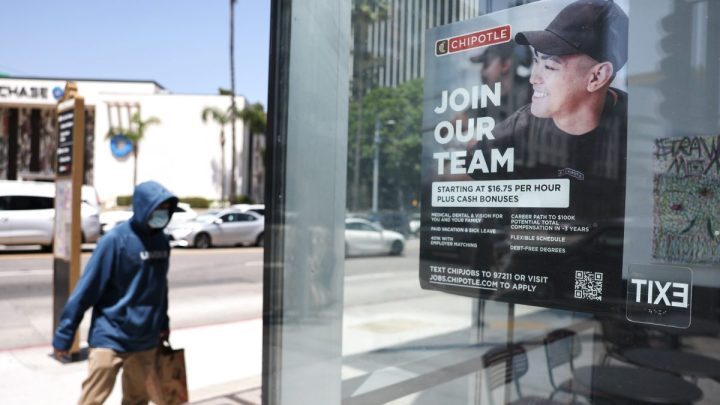
Slowing wage increases are good news for the Fed, but bad news for workers
Slowing wage increases are good news for the Fed, but bad news for workers

The Federal Reserve’s Open Market Committee has a lot of data to pore through before it meets next week to decide whether to pause its rate hikes for the moment. Some of that data is about trends in wages.
Some workers saw big gains when employers were frantically trying to staff up in the aftermath of the pandemic, and while some policymakers don’t think rising wages have contributed much to inflation, others think they’re a big contributing factor.
And they just got some good news on this front: Wage gains seem to be moderating. Average hourly earnings were up 4.3% year over year in May, which is still higher than before the pandemic. But a year ago, they were growing by almost 6%.
It turns out that wages employers are offering for open positions are rising slower too.
Job postings have been falling as the labor market gradually cools down from the red-hot hiring frenzy of the past few years. At the jobsite Indeed, which is a Marketplace underwriter, job postings are down more than 15% since last spring.
And “wage growth is coming down,” said Nick Bunker, Indeed’s director of economic research. It’s still pretty strong — 5.3% on an annual basis last month, according to the jobsite.
“But that’s a considerable slowdown when compared to what we were seeing at the beginning of 2022, when posted wages were growing about 9.3% year over year,” Bunker said.
Now, keep in mind, advertised wages are often set pretty high to entice people who already have jobs. Bunker predicts these wage gains will keep slowing and reach pre-pandemic levels by early next year.
Employers are now facing less pressure to outbid each other as their workforces stabilize, said Joe Galvin at small-business advisory firm Vistage.
“As CEOs downshift into a slowing economy, they are turning the dials of slowing the increase of head count, not replacing open jobs,” he said.
Meanwhile, recent job cuts in tech, media, finance and elsewhere have some workers worrying they’ll face outright wage losses, said John Leer at Morning Consult.
“Higher-income workers are extremely nervous about their near-term job prospects,” he said. “They increasingly expect to lose pay or income over the next four weeks.”
The situation’s not so great at the opposite end of the income spectrum either. Wage gains are actually slowing the most for low-wage workers, said Indeed’s Bunker.
“This tighter labor market let wages grow faster for workers at the bottom of the income distribution,” he said. “And what our data suggests is that period of reducing inequality might be fading.”
What’s more, according to Tulane economist Gary Hoover, is that prices are still rising faster than wages. That means that workers are falling further and further behind.
“The drop back to normality in wages is preceding the drop in prices, which is actually putting those people at the bottom of the wage distribution at a disadvantage,” he said.
Hoover’s biggest worry? That job growth will also stall along with wage gains. Then there will be more people with no income facing higher prices.
There’s a lot happening in the world. Through it all, Marketplace is here for you.
You rely on Marketplace to break down the world’s events and tell you how it affects you in a fact-based, approachable way. We rely on your financial support to keep making that possible.
Your donation today powers the independent journalism that you rely on. For just $5/month, you can help sustain Marketplace so we can keep reporting on the things that matter to you.

















